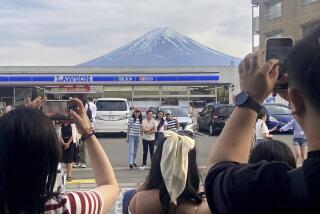Town Faces Emotional Fallout After Japan’s Nuclear Accident
- Share via
TOKYO — The signs at the city limits that once proudly proclaimed “Town of Nuclear Energy” have been replaced with bland placards that say simply, “Welcome to Tokaimura.”
It is one tangible sign of the shame that the town--previously viewed as an elite center of nuclear power research--now feels in the wake of Japan’s worst nuclear disaster.
The Sept. 30 accident at the privately owned JCO Co. nuclear fuel processing plant occurred when workers set off a fission reaction while loading excessive amounts of highly enriched uranium into a tank. The accident is known to have irradiated at least 83 people, three seriously.
Whereas the townspeople once “took pride that they were helping develop Japan’s nuclear energy program,” with 14 nuclear-related facilities in and around the town, outsiders now “see Tokaimura as an area polluted or dangerous, even equated with Chernobyl, Hiroshima or Nagasaki,” Mayor Tatsuya Murakami told reporters here Friday.
Japan has embraced the peaceful use of nuclear power to supplant its dependence on imported fuel. The U.S. and most Western European nations, in contrast, halted nuclear-energy expansion programs over the past two decades amid high costs and fears after nuclear accidents at Three Mile Island in Pennsylvania and Chernobyl in the former Soviet Union.
The mayor spoke of his pain after receiving origami cranes--which are sent to the sick or injured or placed on graves--from students in Australia and Britain. “On the one hand, I was happy they were sending messages of encouragement,” Murakami said. “On the other hand, I had mixed feelings that the image of Tokaimura had been bombarded with nuclear material.”
The town’s reputation has been so tarnished that there has been talk of changing its name, the mayor said. Farmers can’t sell their produce because of consumer fears that it is tainted--even though the government has declared it safe and Japanese Prime Minister Keizo Obuchi recently ate a sample in a show of support.
In addition, the top bureaucrat at the Science and Technology Agency, Toshio Okazaki, recently submitted his resignation. He offered no explanation. The agency has come under fire for reacting too slowly to the disaster and not adequately policing the nuclear industry.
The agency’s reputation took another hit Tuesday when it was forced to blow up a rocket carrying a satellite. The rocket had encountered engine trouble four minutes after liftoff.
Japan’s parliament is considering legislation that would give the central government more authority in future nuclear accidents and strengthen safety measures at nuclear facilities. One bill would empower the prime minister to declare a state of emergency and set up emergency headquarters near accident sites, a role now carried out by local authorities. Another bill would require nuclear-related facilities to conduct the same safety checks as nuclear power plants. It also would require employees to report any illegal procedures to chiefs of related agencies or ministries.
Three victims of the Sept. 30 nuclear accident, all JCO workers, remain hospitalized. The condition of the most seriously injured victim, Hisashi Ouchi, is deteriorating. “The patient is extremely critical, and his physical conditions remain unpredictable,” doctors at the Tokyo University Hospital said this week.
However, the condition of another worker, Masato Shinohara, is improving. The third worker, Yutaka Yokokawa, was less seriously injured and is reported to be in stable condition.
Mayor Murakami criticized the government’s handling of the disaster and called for tougher regulations. Nevertheless, the majority of Tokaimura residents remain “quite calm” despite their proximity to nuclear-related facilities that generate two-thirds of the town’s revenues, he said.
Reflecting the widespread view in Japan that nuclear power is necessary, Murakami stopped short of calling for the phaseout of the country’s nuclear energy program. Japan plans to add as many as 20 nuclear reactors in the next decade.
“Personally, I feel nuclear power shouldn’t be the only choice,” he said. “In Europe, there are other options being explored and Japan should do likewise, not just say nuclear energy is everything.”
More to Read
Sign up for Essential California
The most important California stories and recommendations in your inbox every morning.
You may occasionally receive promotional content from the Los Angeles Times.













